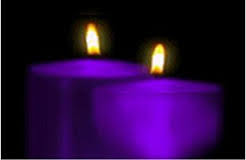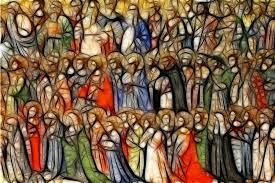Advent II
Isaiah 40:1-11; 2 Peter 3:8-15a; Mark 1:1-8
If there is a theme that runs throughout the scriptures we just heard, I think that theme would have to do with wilderness times. Isaiah writes words of comfort that come from God to a people in the wilderness of Babylon – far from home, far from the comfort of connection with the land and its history, defeated and banished, forever torn from the Jerusalem temple, the abode of God, for not only are they in exile, but that temple has been destroyed.
While we might think about wilderness being a particular kind of physical space – desert, mountains, remote island, perhaps desolate landscape – the kind of wilderness we will think about today is much more an experiential place.
A little over a year ago, as I sat at my mother’s bedside, knowing she was preparing to leave us and watching her every breath for signs that the time had come was such a time for me. Many of you have had such experiences.
The days and weeks following our youngest son’s diagnosis of a brain tumor, before the surgery that proved it to be benign, all those days and hours of waiting and fear, was another wilderness time. Again, I know that some of you have been there and even deeper into the wilderness as a child’s illness or time of injury have played themselves out.
There have been other times of loss and vulnerability and even hopelessness in my life that I would say were wilderness times, times when a sense of being un-moored from my well-ordered life seemed overwhelming. I know that some of you, perhaps most or even all of you know of the wilderness of which I speak.
We’ve all experiences such times to some degree. Perhaps you are experiencing such a time right now. For those who suffer from chronic depression, anxiety, or bi-polar disorder and their families, those living with addiction or existing in an abusive relationship wilderness times may come with some regularity.
 |
| Photo of the Judean Wilderness - near the Wadi Quelt, 2018 |
For a vast number of people throughout the world, for one reason or another, this time of pandemic has been and continues to be a wilderness time. Today, unable to meet in church in person, you may experience a bit of what the Israelites faced when the temple, a central place of religious and spiritual devotion and practice was taken away from them, leaving them in a peculiar kind of wilderness.
Yet not all wilderness time, or not all about the wilderness is bad, tragic, or devastating. There is something holy about wilderness times as well because when all else is stripped away, what is essential and truly important in our lives becomes clearer and more precious. One reason the mystics and desert fathers and religious ordered founded around the wilderness were created was that it is in the wilderness of life that our experience of and relationship with God becomes finely tuned, sharper, clearer.
Therefore, there are some who intentionally seek wilderness as a way of life or a regular component of it. Think of the religious, spiritual, or mental health retreat you may have taken part of or sought out.
When all the distractions, superficiality, and noise of our lives is stripped away, there is more “room” for God. Closer connection can be made. Peacefulness to be attained. Clarity to be achieved. There is something precious and impactful about this kind of wilderness time.
In our first reading, from Isaiah, the prophet announces a time for comfort and reassurance promised by God to those who abide in the wilderness. There is a promise that low places will be elevated, barriers leveled, and those rough places smoothed. Finally, when all else is stripped away, the glory of God will be seen and appreciated and embraced in a way that only seems to happen in the wilderness.
 |
| Advent II |
Yet, we acknowledge, that there are times when the wilderness seems determined to undo us. There are times when the isolation seems too much to bear. I know that for some of you the true isolation that COVID has brought bears a strong resemblance to the wilderness.
It is long and lonely here. It has gone on for so long. The isolation itself coupled with the fear that should you relax and relent from such precautions you might let COVID in, is disheartening, depressing, and difficult.
I am so weary of talking about COVID and I am sure you are weary of hearing about it. Yet the virus has had and still is having such a deep effect on our lives and on our world. Infections are rising, and we are being called upon to hunker down ever more deeply and seriously, as more and more of us are suffering from the virus; even, now, some of the members of our congregation have gotten sick – a fate we had avoided until very recently.
This is a wilderness time unlike any we have experienced before. Hospitals are strained; medical care workers are begging people to wear masks and take precautions; teachers are struggling; and our children and families are wondering how to make this year work as a year of educational progress and developmental growth despite the limitations of our times.
Many extended families, good friends, and neighbors are staying apart to keep one another safe or to protect an elderly or vulnerable person from potentially contracting the virus. This is wilderness. It is the place where you hang on, waiting and hoping for survival.
In our Gospel today, from the very beginning of the book from the evangelist Mark, the opening words we hear are, “The beginning of the good news of Jesus Christ, the Son of God.”
John is in the wilderness. People were going out to him. They were confessing their sins. They were hoping for some hope – that their current situation would not overcome them, that their sins would not define them, that the darkness of the world would not irrevocably shape their future. In other words, they were a lot like us.
And here comes John, speaking the Good News.
Here comes John, the long-predicted voice crying out from the wilderness, the place of chaos, the place of hopelessness, declaring that hope has come. God is sending His son; the messiah is on the horizon, and that he comes with power, and will baptize with the Holy Spirit.
Here comes John, on the very edge of survival – just look at his diet and his clothing. Here comes John, who has preached repentance to the throngs who have come out to here him preach. Here comes John, anticipating the coming of salvation, and declaring the power of Christ who is coming.
In the midst of our wilderness time, we declare that indeed, Jesus Christ is coming. This is cause for great and final hope. For Jesus carried with him the salvation of the world, the forgiveness of sin.
In Jesus we have no fear of COVID or disease, of loss or death. In Jesus we have no fear that the hopelessness that surrounds us in the world will have the final say, but instead, from the love of God issues for the light that will banish the wilderness darkness.
This is a message of astounding joy and gladness for us as we continue our Advent journey. There is comfort in our God. There is comfort that God’s love is strong enough to banish the darkness and for that reason he sends Jesus into the world.
This message brings hope to the hopeless and gladness to those who sit in the wilderness of loss and grief and mourning. There is light and it is the light of Christ that will turn your mourning into rejoicing. God cares for your suffering. God cares for your ultimate joy. God not only speaks into the dark places of our lives but through Jesus Christ, God eradicates them.
Comfort, comfort my people, says your God. I am sending one into the world who is my good tidings for the creation. God sends Jesus into the world not with the might of terrible armies before and behind him, but healing, and love, mercy, and compassion, joy and delight. The wilderness will bow before him.
In Christ, there is no wilderness that can overtake you, only wilderness that will give way to the glorious coming of Christ. He will come. He will gather his flock, feed his sheep, carry his lambs, all for the sake of his love.
While we wait, let us prepare. While we wait, let us hope. While we wait, may we lift up our fervent prayers for the sake of the world. Let us make the most of wilderness times that take away the excesses of our lives and keep us from focusing on Jesus. Let us know that in Jesus, the darkness will soon be over, the wilderness will give way to his glory, and peace, love, and joy will be ours through Christ Jesus our Savior and Lord. Amen.




